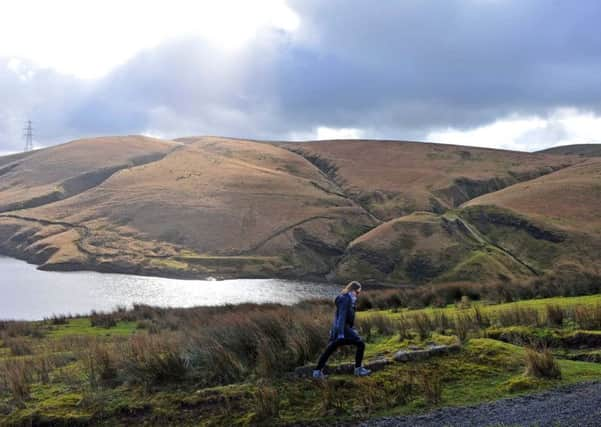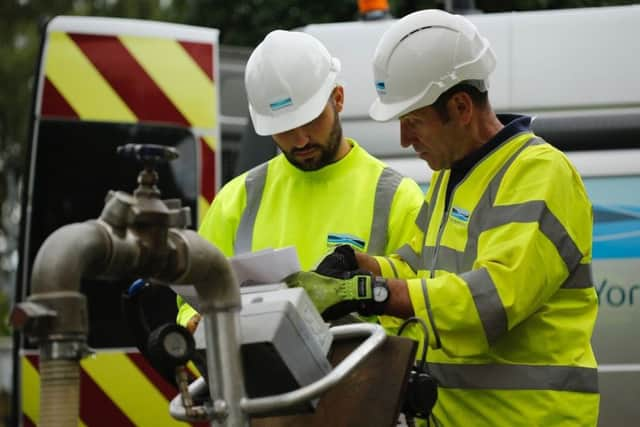Yorkshire Water sets out long-term plan for the future


Measures to improve transparency, environmental impact and infrastructure will all form part of the new strategy announced by the provider.
Among the changes are plans to potentially use treated waste water as opposed to drinking water in supplying manufacturers, greater water conservation and alternative infrastructure which makes better use of the natural environment.
Advertisement
Hide AdAdvertisement
Hide AdThe Not Just Water strategy, based on consultation with 18,000 customers, is also likely to see the Bradford-based company begin to provide greater information to customers about how the business is financed.
Liz Barber, director of finance, regulation and markets, told The Yorkshire Post that the strategy “doesn’t just set the activity for the next five years, it sets the tone, it is all about serving our customers and serving Yorkshire broadly”.
Ms Barber said that there would potentially be significant changes to the way it services businesses, in particular manufacturing.
She said: “Speaking to business customers they want to understand consumption.
“We want to work with them to use less water.


Advertisement
Hide AdAdvertisement
Hide Ad“That might seem like an odd thing to do because the more they use the more we bill. But in actual fact one of the key strategic issues is that we are going to have up to one million more people in Yorkshire over the next 15 to 20 years and we don’t want to take anything more from the environment.
“And business customers inevitably want to use a lot more water than domestic customers.
“So what I would expect them to expect from us from the wholesale relationship is much more proactive and to use water in their manufacturing processes in a different way.”
Ms Barber used the examples of two waste water treatment plants in Leeds and in Hull which are based next to industrial sites that use water in their processing.


Advertisement
Hide AdAdvertisement
Hide Ad“We thought ‘why use pristine water from the environment and making it drinkable and then piping to industrial users who might be able to use treated waste water?’.
“We are doing pilot schemes to see how this works
“It will have an impact on their cost and mean we have got a much more resilient water supply for people who need clean water. We will look at the water cycle in a much more holistic way to improve service and reduce cost.”
Ms Barber added that holistic change was also key to meeting its environmental requirements.


“We are very proud of the clean-up in Yorkshire’s rivers, in particular the Don, the Rother and the Aire,” he said.
Advertisement
Hide AdAdvertisement
Hide Ad“For the first time since the Industrial Revolution we are going to get migratory salmon back in those rivers which is just fantastic.
“But when we stand back and do our holistic environmental impact studies there has been a carbon cost to that. We have to be transparent about it because we have had to build more treatment works and use energy to treat the water to make it clean.
“So we need to look at ways in which we can improve the environment but not improve one part at the expense of the other. We need to think much more holistically and in a way that uses more natural capital.”
Part of the drive toward greater transparency will also concern the way Yorkshire Water manages its finances.
Advertisement
Hide AdAdvertisement
Hide AdThe firm announced late last year that it would close its holding companies in the Cayman Islands and has faced criticism in the past over the level of corporation tax it pays.


“In terms of the national debate around financing and offshore structures, we were the first to say we will remove our Cayman registered companies,” said Ms Barber.
“They were nothing to do with tax but the perception was not positive.
“So it was time to get rid of them, it was a complex thing to do but we got on with it.”
Advertisement
Hide AdAdvertisement
Hide AdWhen asked why the firm was putting together such a long-term document, Ms Barber said: “Because we are a long-term business and when we are putting together our plans for investment we need to know every time we invest for the next five years that is going to be sustainable for the longer term.
“If you look in five-year chunks with the water industry you might end up in the wrong place.
“We may be privately financed but we provide a public service and have a great impact on the greater community of Yorkshire.
“People can’t choose who provides them with their wholesale water services so we think that if they don’t have a choice then we have got to do better.”